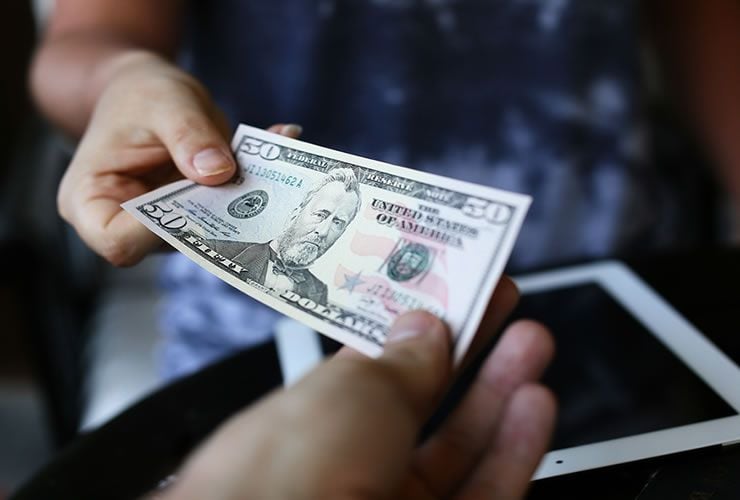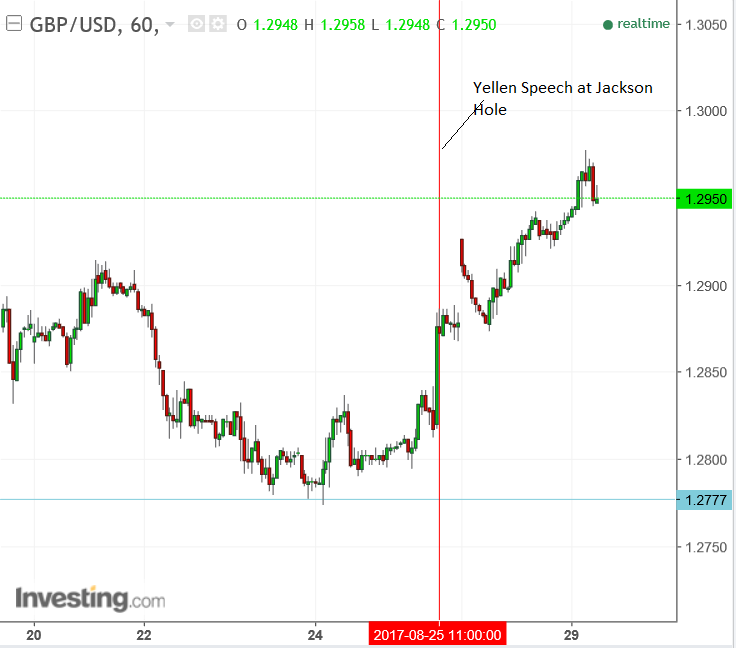US Dollar Takes a Hit as Markets Discount Fed Rate Rises Further

There is much talk on global FX markets at present concerning the Dollar's North Korea-inspired weakness.
While this is certainly playing a part in the Greenback's underperformance we note that it is however likely that the core driver of the weakness is a repricing of US Federal Reserve interest rate expectations.
The Pound lost ground against the Dollar during August, but since stationing on August 24 it has started a recovery which has taken it from lows of 1.2774 to highs of 1.2978.
It is no coincidence that the Dollar also weakened against both the Euro and the Yen over the same period - the common denominator - in all these cases appeared to be the fragility of the Dollar.
A major reason for its weakness was the change in interest rate expectations since Fed governor Janet Yellen's speech at the central banking symposium in Jackson Hole Wyoming.
The problem with Yellen's speech was more what it did not say rather than what it did say.
Whilst Yellen was relatively upbeat about the economy and the labour market she gave no hint of when the Federal Reserve would next be raising interest rates or about what it was considering doing about its burgeoning 2.5 trillion balance sheet full of bonds bought via QE.
Before Jackson Hole there had been talk of the Fed changing its policy of reinvesting the principle from its stock of maturing bonds, however, Yellen made no mention of this in her speech.

Above: The Fed is in charge of GBP/USD direction.
It is this, perhaps, more than the lack of forward guidance on interest rates which may have hampered market expectations, as even quite sceptical analysts had expected some talk of how the Fed would be dealing with the 'run off' from its huge holdings.
The bonds are a hangover from when it undertook massive QE, or monetary stimulus, following the financial crisis.
During that time it bought thousands of bonds from struggling financial institutions to provide them with emergency liquidity.
When these bonds have matured the Fed has reinvested the principle in buying new bonds, however, this is now seen as unnecessary, nevertheless Yellen gave no hint the practice would be coming to an end at Jackson Hole, signalling the Fed wants to keep policy more accomodative than previously thought.
Yellen's discretion on the balance sheet, however, appears to have infected more general expectations about when the Fed is going to raise interets rates again.
The assertion appears to be backed up data from the CME Group Futures exchange which calculate's the market-based probabilities of the Fed rasing rates in the future using Fed's Funds Future's pricing.
Accoriding to the CME data, the probabilities of a Fed rate rise have diminished in the last month, and also the last few days.
For example, the chances of the Fed raising rates at the November FOMC where never high, but they have fallen still lower from 9.0% a month ago, to only 4.0% on August 22, to only 1.9% now.
The probabilities of a December hike have fallen from 42.8% a month ago to 37.3% a week ago to 30.9% now.
Even a strong payroll result later this week, on Friday, is expected to struggle to lift the Dollar.
"This week the payroll report should give further confirmation of a buoyant labour market that is operating at or near full employment. However, interest rate markets have continued to reduce their expectations for medium term rate hikes, ad are pricing less than a full Fed move for the entirety of 2018 - a very large gap with the expectations of even dovish Federal Reserve officials," said Forex.com's Fawad Razaqzada.
There may be other reasons for the Dollar's weakness as well - chief of which is the huge hurricane which has just flooded the city of Housten and threatens to do damage on a scale equal to huricanne Katrina.
"If the economic costs of Hurricane Harvey which wreaked havoc over the weekend in Texas turns out to be unexpectedly high then the Fed may have to be even more patient in normalising monetary policy," said Razaqzada.
In 2005 when Katrina destroyed New Orleans the Dollar fell from a high of 89.26 at the start of August to a the September lows of 85.97- the hurricane hit at the end of August - however, on a larger scale the move proved just a correction in the dominant uptrend for the Dollar, which suggests Hurricane Harvey may not be such a major bearish factor for the greenback as some fear.
Much like the Yen gaining after the Fukushima disaster due to the boost to the economy from the expected rebuilding work required, so the same effect may offset temporary knee-jerk selling of the Dollar.
Another factor weighing on the Dollar has been, "the percieved political risks around the lifting of the debt cieling by Congress in the next few weeks," said said Enrique Díaz-Álvarez, chief risk officer at FX broker Ebury.
He further goes on to argue for further depreciations of the Dollar against the Euro.
"Markets mostly looked at strong macroeconomic news from the Eurozone and sold-off the Dollar in still thin holiday markets. The mass of speculative bets for further Euro appreciation increased to yet another record. Emerging market currencies continue to perform well as market appetite for riskier assets remains strong," said Alvarez.
Swiss Bank Swissquote's analyst Yann Quelenn thinks the Dollar is now, "heavily oversold" but admits the fundamentals favour even more weakness.
"The dollar continues to weaken, as the US Federal Reserve Bank seems to be dithering on its promises to ‘normalise’ interest rates. The US central bank had been indicating a third boost before year end, but now markets are assuming this will not happen," said Quelenn.
